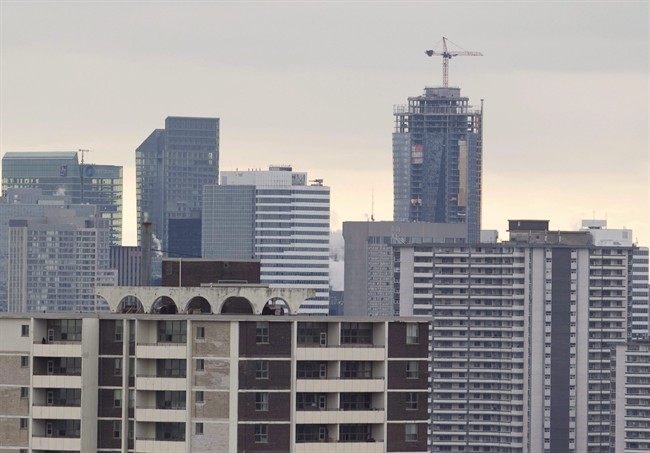As real estate prices ballooned in Canada’s biggest cities, so has rent, prompting calls for expanded rent control in Toronto.

Ontario is developing “substantive rent control reform,” the housing minister said Thursday, as the provincial NDP push for rent control to be expanded to all tenants in newer units to have the same protections as all other renters.
READ MORE: Condo rent in Toronto is almost $2,000 a month on average
The desire for rent control is simple to understand — having a roof over your head is a basic necessity of life, and the cost for housing is often the biggest monthly expense of a person’s budget. When rent controls are not in place, renters are at the mercy of landlords potentially sending their rental costs through the roof.
However, that’s only one side of the situation.
Global News spoke with Bob Aaron, Toronto real estate lawyer and investment property owner, and Jeremy Jackson, president of the Investment Property Owners Association Nova Scotia (IPOANS) and VP of marketing for Killam Properties, about the possible drawbacks of rent control.
Investment will slow
The building industry is booming in Canada, and employs a lot of people.
“It’s funding the construction industry, it’s funding all the people who supply the building trades, it’s providing jobs and it’s providing rental accommodation,” Aaron said.
WATCH: Numbers show it’s harder for millennials to buy a home than it was for their parents
Imposing rent control in Toronto could impact jobs and the economy as whole.
“If we impose rent control now, nobody will ever trust the government again,” said Aaron.
“The construction of new apartments building and rentals will cease immediately.”
Nova Scotia abolished rent control in 1993 — Halifax-based Jackson said investors are likely to shy away from putting their money into a market where the return on investment is capped.
“If there’s a market that’s known to have pretty aggressive rent control, the larger companies may well stay away from investing there,” said Jackson.
“There’s just too many restrictions.”
WATCH: Vancouver rental incentive program hurting tenants, benefiting developers, experts say

Supply could shrink
Along with a lack of new building activity, Aaron believes the market would shrink as investors lose interest and sell their properties, resulting in fewer rentals on the market.
“Nobody would buy another rental unit, and for sure nobody would ever build another rental unit,” said Aaron. “Nobody would buy a new condo with the intention of renting it out.”
Overall, the number of rentals on the market would be reduced.
“I think it would destabilize the entire rental market…the tight market would get even worse,” said Aaron.
Buildings will fall into disrepair
Property owners are sometimes faced with costs rising faster than rent, Jackson said.
“Your property taxes are going up, your utility prices are going up and you’re not allowed raising your rents to beyond a certain degree — it’s absolutely pinching them to the point where they think, ‘Now I’ve got to make a decision — what am I going to do?'” Jackson said.
READ MORE: City of Toronto liable for failure to notify group of tenants about rent reductions
That’s when maintenance and upkeep might end up on the chopping block.
“If we didn’t have above-guideline increases, nobody would ever repair anything,” said Aaron.
Buildings built before 1991 are rent-controlled in Toronto. The province sets an annual rate that rents can rise, and an owner must appeal to a board to justify anything beyond that based on work done to the building.
The City of Toronto has a solid building department that responds to concerns regardless of a building’s rent-control status, Aaron said, noting renters have that outlet to lodge a complaint.
WATCH: Rent strike? Halifax public housing residents decry maintenance issues

Blame the government, not the property owners
The government is wary of putting a stop to economic growth to curb rental prices, both experts agree.
Governments need to work on increasing subsidized housing, and give developers a reason to build rental units.
“Are there incentives for private developers to build units that will be marketed towards that segment?” Jackson said. “The government has to have some discussions… around that front.”
They don’t call them income properties for nothing
Property management companies and investment property owners have an objective: to make money.
READ MORE: Vancouver ranked third most unaffordable housing market in the world
“At the end of the day, these are income properties, and if you speak to a number of folks… there’s lots of little people out there that buy a home or a two-unit or three-unit apartment, and that is their nest egg,” said Jackson.
- ‘Beast Mode’: Former Canuck Ryan Kesler back in Vancouver for Game 2 vs. Nashville
- Woman shares carjack nightmare: ‘I can’t believe this is happening in Victoria’
- No Demko but plenty of spirit as fans prepare for Game 2 of Canucks playoff run
- Caught on video: B.C. firefighter survives hit-and-run outside his own home




Comments